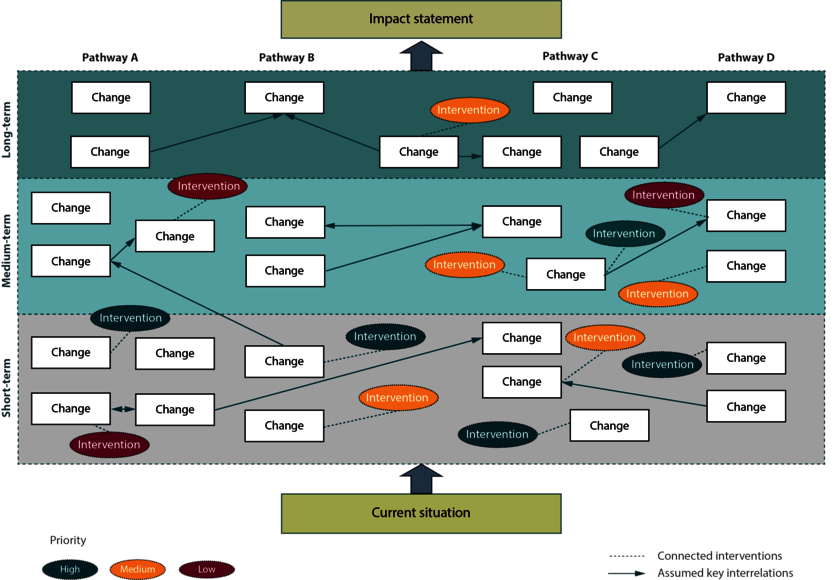Theories of Change
Advancing interdisciplinary integration through Theories of Change
By Sabine Hoffmann and Lisa Deutsch

Over the period of one year, the Wings program iteratively developed ‘Theories of Change’ to advance one of the key features of inter- and transdisciplinary research: the integration of different disciplinary perspectives into a coherent whole. Since integration does not happen automatically but requires continuous and proactive leadership, we introduced a new tool – Theories of Change (ToCs) – with the aim of supporting the Wings program in its integrative efforts.
ToCs are used to sketch out our, i.e. the Wings team’s, implicit assumptions about key mechanisms and conditions for supporting change in the urban water sector. As a first step, we jointly defined an impact statement (“By 2030…”) for each Wings pillar and the overall program. Based on each impact statement, we applied backcasting, hence jointly mapped out necessary changes and preconditions in the long-, medium- and short-term to realize the desired impact. During this process we also reflected upon our underlying assumptions behind each of these changes (why is X connected to Y and how does it influence Z?). Thereby, it became apparent that changes are required at different levels and within different domains (e.g. technology and market development, small-scale experimentation and large-scale implementation, actor’s engagement, regulations/institutions and an overall paradigm shift). This mapping was complemented by discussions on how our research links to societal changes, i.e. how certain activities and outputs (e.g. policy briefs, fact sheets, etc.) might lead to certain outcomes (change in knowledge and behaviour) among key actors in the urban water sector. When knowledge or collaboration gaps became apparent, we brainstormed potential new activities with key actors from policy and practice.
Throughout numerous iterations and different interaction formats (retreats, workshops, group and bilateral meetings) an integrated picture emerged, which will support the Wings team in planning future research activities, monitoring the program’s impact, and in learning about and reflecting on how change evolves in the urban water sector across different contexts. In addition, it will support the program in increasing both its scientific impact (by strengthening interdisciplinary collaboration) and societal impact (by identifying and addressing critical societal needs for practical water and sanitation solutions) with the help of the developed ToCs.
Key insights
- ToCs are fruitful boundary objects to bridge and integrate different perspectives
- They are not set in stone but “living products” i.e. they are adapted in time as change manifests and new knowledge emerges
- ToCs serve as visioning, planning, monitoring, learning and reflection tool for inter- and transdisciplinary teams
Upcoming publications & presentations
- Deutsch, L.; Belcher, B.; Claus, R.; Hoffmann, S. (prep.) “Leading inter- and transdisciplinary research: Lessons from applying theories of change to a strategic research program”
- Deutsch, L.; Doll, C.; Hoffmann, S. (2020) “Empirical insights from leading inter- and transdisciplinary integration within Wings and Water Hub”, Eawag Symposium, Dübendorf, Switzerland.
- Hoffmann, S.; Deutsch, L. (2020) “Zielorientierung durch ‘Theories of Change‘ – Empirische Erkenntnisse aus einem inter- und transdisziplinären Forschungsprogramm”. tF-Symposium 2020: Wege transformativer Forschung: Zielorientierung und Indikatoren, Darmstadt, Germany.




